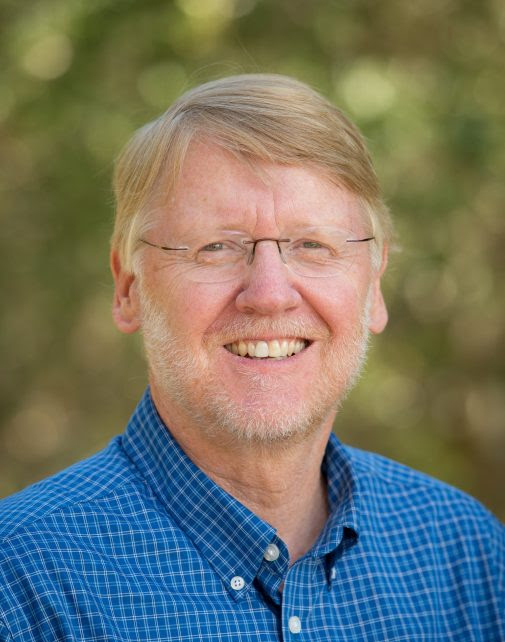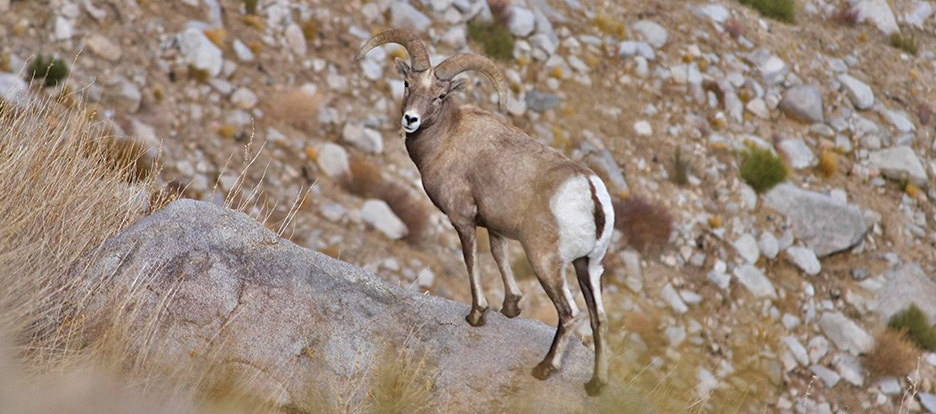An Art of Conducting Oneself
By Paul Willis
 There is an art of conducting oneself in the lower regions by the memory of what one saw higher up. —René Daumal, Mount Analogue
There is an art of conducting oneself in the lower regions by the memory of what one saw higher up. —René Daumal, Mount Analogue
Sitting here, high on the shoulder of a peak in the Ansel Adams Wilderness, I am looking down at a grassy swale where I startled a herd of eleven mule deer. From this height they are now too small to be seen, but they kept their ground as I detoured around them on scree and talus, not wanting to disturb their pasture. And looking down in the other direction, a blood-red canyon drops away to the round expanse of an alkali lake, from this vantage point its two or three islands an obvious continuation of a series of craters to the south. And, looking up, the summit of the mountain I'm on rises gently, inviting me to visit before thunderheads build and explode, just as they did yesterday on my way down another summit. Such a relief to be lost in sky, no other purpose beyond placing the next boot, the next hoof.
There are bighorn sheep up here as well, though I've yet to see one in the Sierra. Almost fifty years ago, my brother brought a pair of ram's horns back from a ledge just north of here. (Then, conscience-stricken, he returned them.) A few years later he came home from a cold mountain in Alaska without his fingers or his feet. He was supposed to come on this hike with me—he on horseback, I on foot—but what is left of one of his feet is sore and infected, and so he had to take a pass. Exactly fifty years ago we climbed our first peak together, in the Cascades of Oregon, and I climb this mountain thinking of him. A neighboring summit, according to the guidebook, was first ascended on horseback in 1864, and certainly my brother could have ridden up the shallow slopes that I climb now.
As I pause again beneath the crest, seven dished-out resting places appear at my feet. For deer, by the look of the scat, though what if these are bowers for bighorns? I'd rest here too—am resting here—as I think about the last few steps to the summit, that place where earth becomes the air and there are no more steps to take. And then, having lunched and lingered on the top, traversing from one peak to the next for a better view, I see a flash of white rumps, curved horns, as six or eight bighorn sheep clatter over the edge of the slope. A miracle of wish and witness, there and gone. But one has seen, says René Daumal. And as I descend, I carry with me the stutter of hooves into the stubborn cliffs below.
Paul Willis is a professor of English at Westmont College in Santa Barbara, California. He has published six collections of poetry, the most recent of which are Deer at Twilight: Poems from the North Cascades (Stephen F. Austin State University Press, 2018) and Little Rhymes for Lowly Plants (White Violet Press, 2019). He is also the author of an eco-fantasy novel, The Alpine Tales (WordFarm, 2010), and of the essay collections Bright Shoots of Everlastingness (WordFarm, 2005) and To Build a Trail (WordFarm, 2018). Years ago, he played a small part in gaining protection for the Salmo-Priest Wilderness in the northeast corner of Washington state. www.pauljwillis.com
Photo: Bighorn sheep by Steve Yeager
Editor's note:
“Wilderness Experienced” is our shared stories and musings about recent experiences in our nation's Wildernesses. Stories focus on the virtues of Wilderness and/or challenges facing the National Wilderness Preservation System. We want to hear your story! Learn more and submit a story.
Commenting guidelines:
We encourage readers to engage the authors and other commenters through the comment feature. Please be respectful and thoughtful in your response, and focus your comments on the issues/experiences presented. Please refrain from personal attacks and harassment, using rude or disruptive language, providing misinformation, or promoting violence or illegal activities. We reserve the right to reject comments. Thank you for your cooperation and support.
Click here to read another Wilderness Experienced story. See what you can do to defend America's National Wilderness Preservation System here.
When you subscribe to the blog, we will send you an e-mail when there are new updates on the site so you wouldn't miss them.
Contact Us
Wilderness Watch
P.O. Box 9175
Missoula, MT 59807
P: 406.542.2048
Press Inquiries: 406.542.2048 x2
E: wild@wildernesswatch.org
Minneapolis, MN Office
2833 43rd Avenue South
Minneapolis, MN 55406
P: 612.201.9266
Moscow, ID Office
P.O. Box 9765
Moscow, ID 83843


Comments 50
Truly a wonderful word painting. Then I see the author is an English prof; good for you.
Very touching story. I was particularly interested in that the author had a "small part" in gaining wilderness protection for the Salmo-Priest area.
Small part or no, I thank him. Unfortunately, that tiny piece of wilderness remains the only such protected land in eastern Washington, despite years-long efforts to add other areas, such as the Kettle Range and Colville Forest lands. But to no success up 'til now.
Mark, I was chair of the wilderness committee for the Spokane Group of the Sierra Club in the early 80s. We tried to get the Kettle Range into the 1984 Washington Wilderness Bill as well, but Tom Foley would not include it. (The only reason he included the Salmo-Priest was because of the strength of the Fish-and-Game recommendation to protect the mountain caribou there, but even with some wilderness protection, the herd has now almost vanished.) My wife and I particularly loved cross-country skiing in the relatively gentle Kettle Range--a great place for not-so-great backcountry skiers like ourselves!
Paul: Thanks very much for your response. Back then I didn't pay nearly as much attention to the goings-on in Eastern Washington as I do now. I did not know about Tom Foley's lack of support for wilderness designation in his district. Eye-opener.
What a lovely and thoughtful story! Most enjoyable...
Words evoking powerful imagery is often more compelling and impactful than photos on paper or computer screen, which is exactly what your story has achieved. 'Conscience-stricken' resonated deep within me and brought back immediate memories of my time living next to a glacial-fed river in Oregon. The log cabin, situated 50-feet above the flowing water, was my place where I could watch and rarely disturb any of the 18 species of birds that shared their space with me. Only one time in 13 years did I venture down to the river...I couldn't bring myself again to prevent wild creatures from feeding, resting, or rearing young.
The art of conducting oneself seems a necessary teaching these days. Respect for other life forms is rare and yet its continued absence could easily have consequences far beyond our human capacity to remedy.
Thank you, professor Willis, for your beautiful story and what I hope will be an ongoing shared experience that our younger generations are inspired by.
Gratefully yours
#KeepItWild, #KeepItClean, #ProtectTheEnvironment
Bumped into this looking for another site. All's ah can say, mister writer-man ,is "prose as itz supposta B." NICE.
And the Indigenous all say:
"Ya think?????" (O yeah, really)
May you (we all)find your(our) medicine
Blessings,
MartinJB
I believe beautiful wilderness for all of god's creatures should be preserved so wild animals can live peaceful and happy lives.
beautiful piece, thank you.
Very beautifully written. Your title is perfect... experiencing something in the remote wilderness, such as you have, can forever change you. It's such a privilege. Thank you for sharing!
Thank you for this wonderful visual of your hike. Wish I could have been there. So sorry about your brother, but I'm sure your writing brings him along also. We never know when our "last" hike will be - carpe diem and relish your memories.
I always hope to see wildlife while hiking. Imagining what their day to day lives are like while we drive to and from our trailheads. Your line, "Such a relief to be lost in sky, no other purpose beyond placing the next boot, the next hoof." captures my state of mind on mountains. Why do I hike? Because I do not think of anything other than the view and that next firmly placed boot step.
A big thanks to everyone for your comments, suggestions, information, and appreciations! It is good to know that we hold these experiences in common.
I enjoyed being transported to the Ansel Adams Wilderness Area via this essay, if only for a few minutes... thank you!
Thank you for enabling us to share your experience. I will especially carry your "lost in sky" metaphor with me
Thank you for sharing your beautiful story, Paul!
Thank you for taking me with you Paul. Through your incredibly clear and breath-taking writing, I SAW the bighorn sheep, too!
Wonderful! Such a beautiful economy of language.
As I was scanning my e-mails this morning, this was a very-needed surprise. Thank you, Professor Willis, for taking me away from a stuffy room and into the fresh air and soul-filling beauty you described. Your words reminded me just how much I need more nature in my life. By the end I had tears in my eyes. Thank you.